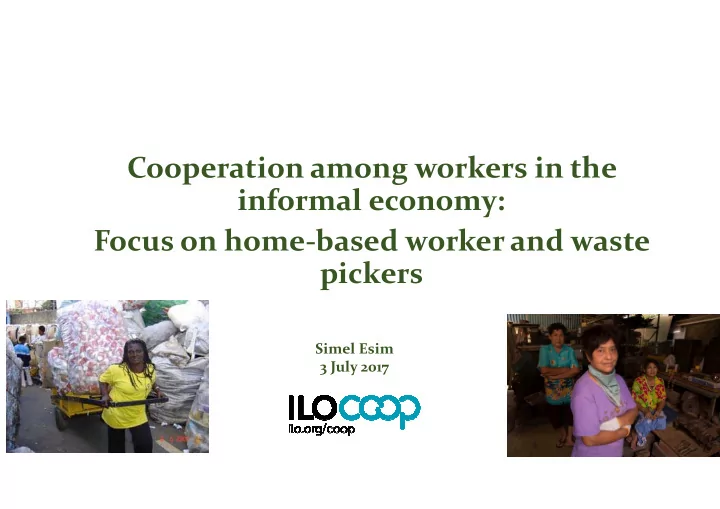

Cooperation among workers in the informal economy: Focus on home-based worker and waste pickers Simel Esim 3 July 2017
ILO – WIEGO initiative Aims to deepen understanding of the nature and role of cooperatives and other SSE organizations and enterprises in formalizing the informal economy Initial focus on waste pickers and home workers, with a view to expand to other target groups such as domestic workers and street vendors Methodology: Survey & interviews with 50 respondents (21 HBWs from 10 countries, 29 WPs from 6 countries), mainly by WIEGO staff and through WIEGO/ILO partners Literature review – conceptualization of cooperatives of HBWs & WPs, as well as case studies
Key findings I - Characteristics Legal status: Coop structure: Sources of funding: Most entities legally registered. Adherence to coop values & Member dues relatively small & Under various laws (coop, principles, regardless of the often times insufficient - micro-enterprise, association, organizational type Therefore need financial etc.) support from external actors Structures such as BoD, Reasons for registering: committees in place Access to incentives & support from local and national governments and private sector; HBWs: Financial reasons are the most important WPs: Access to social benefits and social protection are the priorities
Key findings II - Activities Activities and functions: Economic benefits: Financial service provision: WPs: Collecting, sorting, Coops support market access, Crucial for members’ recycling of waste work space, training and skills livelihoods & for cooperatives upgrading HBWs: Diverse activities e.g. Through government or credit garment production, clothing, Skills training: unions in form of e.g. crafts; food, catering, farming microloans Technical and legal training, through subcontracting and accounting, business planning Some coops provide microloans own-account work to members for equipment or HBWs: production skills, raw materials as well marketing, use of equipment, also leadership training WPs: technical skills and advocacy skills
Key findings III – Voice & recognition Voice & recognition: Economies of scale: Fighting stigma & HBWs: Supply of materials at marginalization through lower costs; sharing of work negotiation, creating alliances & space & equipment mobilization WPs: Negotiate with big waste Negotiations and sales: generators Support of larger organizations Alliances and affiliations: increases negotiation power With other coops, trade unions, Negotiations with buyers social movements at different (enterprises, middlemen), levels NGOs, other coops WPs: Strong national, Sales often through international affiliations intermediaries HBWs: Some national & Negotiate with state for social subregional networks benefits and improved conditions – advocacy efforts
Key findings IV - Challenges Economic & market-related Policy-related Internal Difficulties in achieving real Old laws that do not reflect the Weak structure, internal economies of scale current realities tensions, lack of a common vision, absence of strategic Weak institutional Laws that may not be pro-poor planning, lack of technical & infrastructure or recognizing informal political know-how & capacity economy workers’ rights WPs: Privatization of waste building, blurred division of management systems Lack of enforcement of existing work laws & local regulations that can HBWs: Competition with larger facilitate access to available companies infrastructure & services
Recommend
More recommend